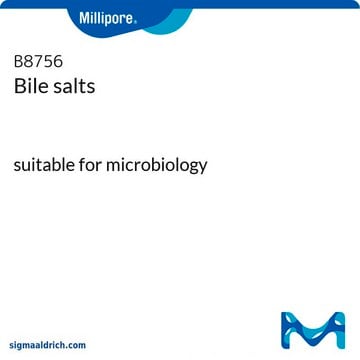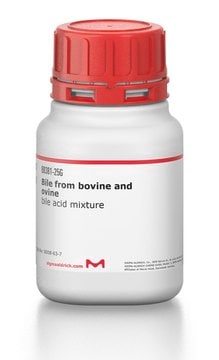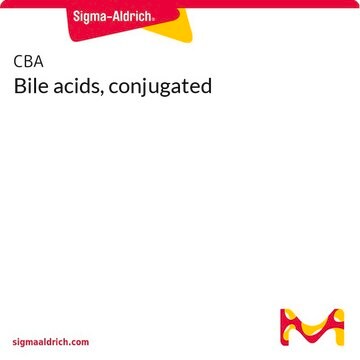B8631
Bile extract porcine
Synonym(s):
Bile acids, Hog Bile Powder
Sign Into View Organizational & Contract Pricing
All Photos(1)
About This Item
Recommended Products
Application
Bile extract porcine has been used:
- as a supplement in brain heart infusion (BHI) medium to culture Listeria monocytogenes LO28
- to investigate the survival of probiotic bacteria through the gastric-small intestine
- as a supplement in BHI mediato study the effect of oxygen on bile resistance in Listeria monocytogenes
Biochem/physiol Actions
Bile from bovine and ovine can be used in bacteriological research to investigate bile salt adaptation of bacteria such as Lactobacillus.
Quality
Contains glycine and taurine conjugates of hyodeoxycholic acid and other bile salts.
Testing Method
Chemical derivatization and HPLC have been proven for separation and identification of complex mixtures of bile acids and bile acid conjugates.
Storage Class Code
11 - Combustible Solids
WGK
WGK 3
Flash Point(F)
Not applicable
Flash Point(C)
Not applicable
Personal Protective Equipment
dust mask type N95 (US), Eyeshields, Gloves
Choose from one of the most recent versions:
Certificates of Analysis (COA)
Lot/Batch Number
Don't see the Right Version?
If you require a particular version, you can look up a specific certificate by the Lot or Batch number.
Already Own This Product?
Find documentation for the products that you have recently purchased in the Document Library.
Customers Also Viewed
Cristina Tudor et al.
Nutrients, 12(1) (2020-01-02)
Sea buckthorn oil, derived from the fruits of the shrub, also termed seaberry or sandthorn, is without doubt a strikingly rich source of carotenoids, in particular zeaxanthin and β-carotene. In the present study, sea buckthorn oil and an oil-in-water emulsion
Armando Hernández et al.
AMB Express, 9(1), 66-66 (2019-05-19)
This study was undertaken to investigate the impact of culture pH (4.5-6.5) and temperature (32-37 °C) on the stress resilience of Lactobacillus reuteri DSM 17938 during freeze-drying and post freeze-drying exposure to low pH (pH 2) and bile salts. Response-surface methodology
Cecilia Tullberg et al.
Food & function, 7(3), 1401-1412 (2016-02-04)
In this work, we investigated lipid oxidation of cod liver oil during gastrointestinal (GI) digestion using two types of in vitro digestion models. In the first type of model, we used human GI juices, while we used digestive enzymes and
Melda Ortak et al.
Journal of food science and technology, 54(11), 3543-3551 (2017-10-21)
In this research, carrot pulp was added to traditional snack made from corn-grit. As the biological activity of carotenoids in the body depends on their bioaccessibility, change in carotenoid bioaccessibility during extrusion processing was investigated. In addition, phenolic content, antioxidant
Gabriele Rocchetti et al.
Antioxidants (Basel, Switzerland), 9(4) (2020-04-10)
In this work, different commercial extra-virgin olive oils (EVOO) were subjected to in vitro gastrointestinal digestion and the changes in bioactive compounds were evaluated by ultra-high-pressure liquid chromatography coupled with quadrupole-time-of-flight mass spectrometry, using untargeted metabolomics. As expected, raw EVOO
Our team of scientists has experience in all areas of research including Life Science, Material Science, Chemical Synthesis, Chromatography, Analytical and many others.
Contact Technical Service













